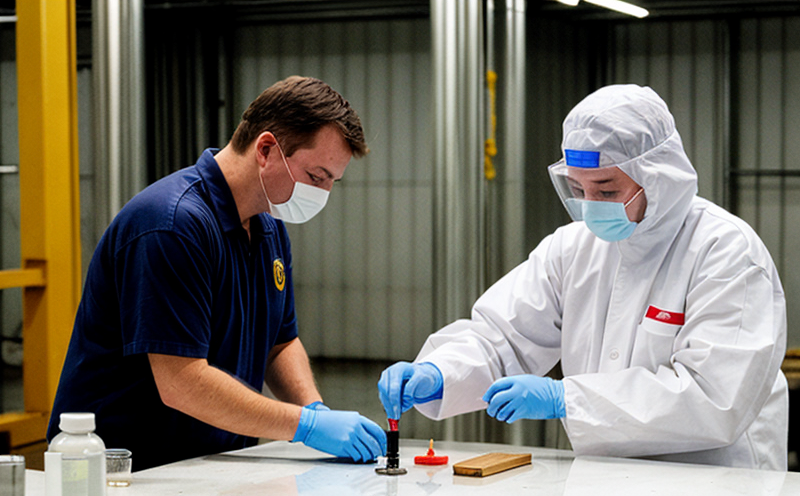ASTM D5276-20 Temperature Impact Test
The ASTM D5276-20 Temperature Impact Test is a critical method used in packaging testing to evaluate the performance and resistance of packaging materials under varying temperature conditions. This test assesses the impact strength of flexible plastic films, sheets, and similar materials that are commonly used in packaging applications. The test simulates real-world conditions where packaging might be exposed to extreme temperatures during transit or storage.
The ASTM D5276-20 specifies a method for determining the resistance of packaging materials to low-temperature impact. It is particularly important for ensuring that packaging remains intact and functional under adverse environmental conditions. The test involves subjecting specimens to a controlled temperature, followed by an impact load applied at a specified height.
The purpose of this test is to provide a standardized method for evaluating the toughness and durability of packaging materials. By using ASTM D5276-20, manufacturers can ensure that their products meet regulatory requirements and perform reliably in various environments.
The test procedure outlined in ASTM D5276-20 involves several key steps:
- Specimen Preparation: Specimens are prepared according to the dimensions specified in the standard. The specimens should be free from defects that could affect the test results.
- Temperature Control: The specimens are cooled to a specific temperature within the range of -50°F to 140°F (-45°C to 60°C).
- Impact Testing: A pendulum with a specified mass is brought down from a height and impacts the specimen. The impact force is recorded, and the test result is determined based on the fracture or non-fracture of the specimen.
- Data Analysis: The results are analyzed to determine the lowest temperature at which the material remains impact resistant.
The ASTM D5276-20 Temperature Impact Test is essential for ensuring that packaging materials can withstand extreme cold temperatures. This test helps manufacturers develop products that meet both regulatory and customer expectations, thereby enhancing product safety and reliability.
In summary, the ASTM D5276-20 Temperature Impact Test is a vital tool in the packaging industry for assessing material performance under low-temperature conditions. By following this standardized procedure, companies can ensure their products are robust enough to withstand harsh environmental challenges.
Benefits
The ASTM D5276-20 Temperature Impact Test offers numerous benefits for manufacturers and quality managers in the packaging industry. Here are some key advantages:
- Enhanced Product Reliability: By ensuring that packaging materials can withstand extreme temperatures, this test helps improve product reliability and safety.
- Regulatory Compliance: Many industries have specific regulations regarding material performance under adverse conditions. This test ensures compliance with international standards such as ASTM D5276-20.
- Improved Customer Satisfaction: Products that pass this test are more likely to perform well in the field, leading to higher customer satisfaction and loyalty.
- Faster Product Development: By identifying potential issues early in the development process, this test helps streamline product development timelines.
- Cost Efficiency: Early detection of material weaknesses can save significant costs by preventing costly recalls and rework.
In conclusion, the ASTM D5276-20 Temperature Impact Test is an essential tool for enhancing product quality and ensuring compliance with industry standards. It provides a robust framework for evaluating packaging materials under low-temperature conditions, leading to more reliable and customer-satisfying products.
International Acceptance and Recognition
The ASTM D5276-20 Temperature Impact Test is widely recognized and accepted by regulatory bodies and industry standards organizations around the world. Its international acceptance ensures that packaging materials can be tested consistently across different regions, promoting uniformity in quality control.
Many countries and industries have adopted ASTM standards as a benchmark for testing and quality assurance. For instance:
- United States: ASTM D5276-20 is widely used by manufacturers, suppliers, and regulatory agencies within the United States to ensure compliance with federal and state regulations.
- European Union: The EU has recognized ASTM standards as harmonized methods for testing materials. This recognition facilitates trade between member states and ensures consistent quality across borders.
- Asia-Pacific Region: Many countries in the Asia-Pacific region, including China, Japan, and South Korea, have incorporated ASTM D5276-20 into their national standards and regulations.
The widespread acceptance of this test underscores its importance in ensuring that packaging materials meet stringent quality and safety requirements. By adhering to ASTM D5276-20, manufacturers can demonstrate compliance with international standards and gain a competitive edge in the global market.
Use Cases and Application Examples
| Use Case | Description |
|---|---|
| Cold Chain Logistics | Ensuring that packaging materials can withstand extreme cold temperatures is crucial for products that require temperature-controlled storage and transportation, such as pharmaceuticals and perishable goods. |
| Pallet Wrapping Films | Evaluating the durability of pallet wrapping films under low-temperature conditions helps prevent damage during transportation and storage. |
| Film Packaging for Frozen Foods | Testing film packaging used in frozen food products ensures that it remains intact and prevents leaks, thus maintaining product integrity and quality. |
| Bulk Bag Liners | Ensuring the strength of bulk bag liners under cold conditions is essential for protecting bulk materials during storage and transport. |
| Packaging for Chemical Products | The test helps ensure that packaging used for hazardous chemical products can withstand extreme temperatures without compromising safety or integrity. |
| Flexible Packaging for Frozen Meals | Evaluating the performance of flexible packaging materials ensures they remain intact and protect the contents during cold storage and distribution. |
| Pallet Wrap for Fresh Produce | The test ensures that pallet wrap used in fresh produce transportation can withstand low temperatures without compromising the integrity of the packaging or the product. |
These use cases demonstrate the versatility and importance of the ASTM D5276-20 Temperature Impact Test across various industries. By ensuring that packaging materials meet strict temperature resistance requirements, manufacturers can enhance product safety, reliability, and customer satisfaction.





